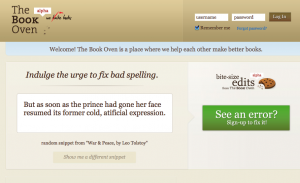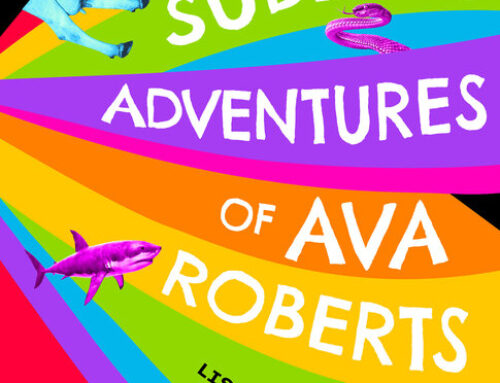 When I read the blog entry about the launch of Book Oven, I saw this as a significant development in the changing landscape of publishing. As I tweeted then, “Sometimes I feel like I’m fooling myself that POD’s losing stigma, but things really are changing.” It was so refreshing to see a well-designed and maintained site talk about print on demand and other tools for publishers with no cynicism or apology. As the site says,
When I read the blog entry about the launch of Book Oven, I saw this as a significant development in the changing landscape of publishing. As I tweeted then, “Sometimes I feel like I’m fooling myself that POD’s losing stigma, but things really are changing.” It was so refreshing to see a well-designed and maintained site talk about print on demand and other tools for publishers with no cynicism or apology. As the site says,
There has been a revolution bubbling in the book world, and digital has arrived: ebooks, print-on-demand, and online sales mean you don’t need thousands of dollars to make & distribute a book anymore. You just need the time and passion and skill.
One of our myths is that writers work alone. In fact, they collaborate all the time: writers share their work, get feedback, editors help them sculpt their language and content, proofreaders clean up their copy, designers make it pretty, other designers make beautiful book covers.
A Space to Collaborate on Books
Book Oven was born of this inspiration: to make an online space where writers could gather a group of collaborators (editors, proofreaders, designer) around their work to help take a raw manuscript through to finished product, and then, if they wish, to sell it through online channels (though of course, if they wish to ship the final manuscript to a publisher, they can do that too; or they can just keep it for themselves).
It’s a really promising and exciting development – proof that self-publishing is becoming legitimized and becoming as natural a part of the writing/publishing process as blogging and other new generation tools. I sat down (virtually) with Hugh McGuire of Book Oven and talked about the direction of the site, as well as how to overcome the stigma issue that surrounds self-publishing. Their goal is to “transform publishing” and they’re off to a good start.
Self-Publishing Review: So how’s the site work? What do people do once they create a project and how can writers contribute to other writers’ projects?
Hugh McGuire: Firstly, we’ve just launched and we have lots of work to do yet. In fact, one of the reasons we decided to open things up before we were “finished” is that we want to build something that writers, editors, proofreaders, designers and readers will love using. We are trying to create a new kind of model for publishing, and in order to do that we need to have the active input of the people who share our vision of something new.
After that intro, what you can do now:
- Proofread texts that are in the system using Bite-Size Edits (it’s fun, if you can believe it)
- Upload your own text, and: a) proofread it yourself using Bite-Size; b) get a private group of people you select to proofread it using Bite-Size Edits c) open it to the world to be proofread
- Accept/reject/modify all Bite-Size Edits, so you retail control of your book.
- Invite reviewers/editors/colleagues to an online reviewing/annotation/editing tool, built especially for long-form texts, which helps you collect editorial feedback in one place; and gives an easy way to implement that feedback.
- Publish your book as ebook/epub, or html
- Eventually you’ll be able to do some other things:
- sell your finished book as an ebook, or as a print-on-demand book (in the Book Oven store, and in partner retailers)
- find editors/proofreaders/designers/collaborators to help work on your book
SPR: What’s in it for readers?
HM: In the coming years, I expect we’ll see readers and writers getting much closer together. And one of the ideas behind Book Oven has always been to introduce new ways that they might interact. For instance, what if, prior to publication, you invited your potential readers to help you proofread your text using Bite-Size Edits? Or, what if you opened your novel to a select group to comment on, annotate, before you published? What if you held a cover design contest for your next book of non-fiction? What if you took one of your existing books, and opened it up for annotation – and subsequently published a second edition, with the annotations?
These are all possible now, and these are the kinds of things we would like to see happen.
But really the answer, for readers, is that Book Oven, we hope, will help spawn a new movement of grassroots, indie writing and publishing. We’ll make it easier for people who wish to publish to do so, but we’ll be giving the tools to allow the collaboration that will make those published books better.
So, what do readers get? More ways to connect with books and writers and writing; more books; more quality in indie publishing; we hope: a vibrant new of grassroots of writing.
I guess in some sense I look at the coming digital revolution in books as similar to the indie revolution that came to music with digital and the web. As a music listener, I now have access to a more wonderful and varied assortment of music than ever before in history, because music is no longer constrained by the physical/economic limitations that existed in the era of radio & record labels. We still have radio and labels, of course, but now we also have a vibrant, thriving music culture enable by the cheap production tools and the infinite global distribution enabled by the web.
The results haven’t been great for labels. For music fans, it’s been wonderful.
I expect we’ll see the same with books, and we’d like Book Oven to be a driving force behind that change.
 SPR: What I first notice on the site is that the writing is…good. In the Bite-Size Edits section you’ve got Ford Maddox Ford and Tolstoy – which is incredibly fun to edit. A couple of writer’s that have uploaded stuff are MCM and Barbara Jean Walsh – both good writers. The old problem with self-publishing is the quality of the writing. How do you exert quality control at the Book Oven – or do you see this as anti-free expression. But supposing in a worst case scenario you’ve got a lot of people uploading poorly thought-out work and users have to sift through all of that. What will Book Oven do to exert a little quality control?
SPR: What I first notice on the site is that the writing is…good. In the Bite-Size Edits section you’ve got Ford Maddox Ford and Tolstoy – which is incredibly fun to edit. A couple of writer’s that have uploaded stuff are MCM and Barbara Jean Walsh – both good writers. The old problem with self-publishing is the quality of the writing. How do you exert quality control at the Book Oven – or do you see this as anti-free expression. But supposing in a worst case scenario you’ve got a lot of people uploading poorly thought-out work and users have to sift through all of that. What will Book Oven do to exert a little quality control?
HM: Book Oven is built for anyone who wants to use it, and we won’t put restrictions on what writing goes in & what doesn’t. For non-writers, however, the quality control will come from helping readers/editors etc find the kind of text they want to find. The internet is very good at allowing people to sort through mountains of information; helping people sift will be important for us.
But I’d like to address the underlying question about quality.
It is my belief that the act of creation is the most satisfying and valuable act a person can perform. Whether that is building a bookcase, or building a company, or writing a song, or writing a novel, I don’t think there is anything more valuable to a person. An act of creation — the vision it requires, the dedication, the discipline, the belief, the stubbornness, the time, and the passion — is more meaningful to a person than just about anything else I can think of.
Now, the next question that’s asked is: well, is it any good? Will anyone like what you’ve created? That’s an important question, and certainly it’s more deeply satisfying to create something that people like than it is to create something that people don’t like.
Whether other people will like what you’ve created is an important question, but it is far less important than the question: have you created something?
With LibriVox (the volunteer, public domain audiobook project I started in 2005), I had this insight at some point: That what we were really doing was providing a platform to allow people who wished to create audiobooks of texts they love, to create them and give them away for free to the universe. That the world gets a huge library of free public domain audiobooks is a wonderful and important fringe benefit. But the main thing we do is enable people to create things they are passionate about.
And it turns out that LibriVox volunteers make some extraordinary recordings; it turns out that millions of people love many of the recordings we make; it turns out that some of the recordings are less good; and that some people find it offensive when they fall upon LibriVox recordings that they don’t like. And it turns out there is a simple solution for that last “problem”: listen to something else.
We never ask whether people who don’t talk as well as Obama should be able to talk; it never occurs to us to tell our kids that if they can’t hit like Babe Ruth, that they should not play baseball; we would never tell our mothers (or fathers) that they can’t cook as well as Gordon Ramsay, so they should stop trying.
Instead we say: try to do the things you love, try to do them as well as you can.
Whether other people will like what you do is a whole other matter, but if you are driven to do something you love, you should work hard to do it.
And if that is publishing a book, so much the better for you and the universe.
If it’s publishing a great book, even better again.
SPR: The stigma about self-publishing is definitely fading. What’s your feeling on self-publishing in general? Do you think it’s totally legitimate, worthy of some of the scorn, the future? All of the above?
 HM: To me the only thing that is relevant is the text. Is it good? Do I like it? Would I read it? If it is a great book, I couldn’t care less what particular publishing model was used to get it to me.
HM: To me the only thing that is relevant is the text. Is it good? Do I like it? Would I read it? If it is a great book, I couldn’t care less what particular publishing model was used to get it to me.
Does more people writing books mean that there will be more bad books? You bet. But that’s a good thing; it means more people are writing books. And more people writing books — especially if they are writing from passion — it means we’re likely to have more extraordinary books.
And as above, the question is: how do I as a reader sift through the mountains of books to find the extraordinary texts that I want to read? And the answer will come from the web.
There are hundreds of millions of blogs on the web. Many of them are terrible and I would never want to read them. (I could say the same of the vast majority of traditionally-published books).
However blogging means that I now have access to so much wonderful writing, about topics that are of particular interest to me. The economic/physical constraints of pre-internet writing meant that I had a smallish choice of content that was deemed commercially viable by companies who distributed content near me; the web means that I have an unlimited choice of content, some of it deemed commercially viable; much of it just interesting to the writer; and lots of it interesting to me. And the key thing about blogging was that it got going because bloggers were reading each others’ work. There was a distributed network of writers connected by the “link” … and by shared interests in the things they were writing about and reading about. The link-connections between bloggers is what allowed people to find more interesting stuff, and encouraged more people to read and write and blog.
So, turning to self-publishing, (specifically talking about fiction) I think what has to happen is a more connected network of independent writers and small presses, who are actually working on/ reading each others work. And if that happens successfully, the stigma that’s now attached to self-publishing doesn’t matter anymore. Especially if the text is good.
SPR: I think I know the answer, but what’s so refreshing about your site is that you talk about print on demand and don’t offer a caveat. Of course print on demand is amazing: anyone can make a book. But still there are detractors. I guess I’m asking for you to explore the caveat and any pitfalls there might be to starting a service like this.
 HM: Yes, I still read the odd article about how dumb “bloggers” are, how bad their grammar is, how they are all opinionated jerks etc etc. You might as well complain about how dumb “talkers” are. I heard someone talking on the bus, and he was an idiot, ergo “talkers are idiots.”
HM: Yes, I still read the odd article about how dumb “bloggers” are, how bad their grammar is, how they are all opinionated jerks etc etc. You might as well complain about how dumb “talkers” are. I heard someone talking on the bus, and he was an idiot, ergo “talkers are idiots.”
It turns out that some of the best writing in the world — about whatever topic you care to mention — is happening on blogs, written by “bloggers.”
What is blogging? Loosely, a mechanism to get written text from a writer to a reader. The “quality” of that written text has *nothing* to do with the mechanism of transmission. And “bloggers” are people who write text and publish it on the web.
What is print-on-demand? Same as above. Just a mechanism.
SPR: How about a few words about LibriVox, for those who don’t know about it.
HM: LibriVox.org is a volunteer-driven project to make public domain audiobooks and give them away to the universe. It’s a totally decentralized project that runs completely on the web. Our objective is:
“To make all books in the public domain available, for free, in audio format on the internet.”
SPR: What sorts of books have been read aloud, and how many?
As of today, our catalog contains 2,547 works, in 26 languages. Our rang of books is constrained only by copyright law and the curious passions of our volunteer readers. We’ve got Austen, Nietzsche, Twain, Sun Tzu, Einstein, Descartes, Thucydides, Sayers, Phaedrus, Machiavelli, Barrie, Goethe, Cervantes, Dante, Dickens, Voltaire, Belloc, Wells, Dumas, Joyce, Trollope, and on and on and on.
SPR: Is this a place for self-publishers to store readings of their own texts? So if I release something free to read on Scribd, can I read the audio book on LibriVox?
HM: No. Our requirements for inclusion in the LibriVox catalog are:
- text must be in the public domain (ie. out of copyright) in the USA
- text must be published (or in certain cases, “notable”)
We send self-publishers to our great friends at http://podiobooks.com.
SPR: How does the success of LibriVox fit into your vision for Book Oven?
HM: The key insight I had from watching LibriVox evolve is this: with the right kind of space and tools on the web, people will organize themselves to do the most extraordinary (and complex) things together. I also learned that many people, given the chance to *help* in the creation process, are very happy to do so, if they believe in what is being created. And by providing a vision about what we were trying to do at LibriVox, and the tools/platform, some wonderful things happened.
So this is what we would like to do with Book Oven:
- articulate a vision for a new model of publishing books, that is totally native to the web
- provide a platform for people to organize how they wish around the creation of books
- enable a grassroots community of bookmakers and booklovers to come together with the purpose of: making & distributing/selling & reading books
SPR: The difference with an audio book and the written word is significant – it’s just not as obvious if the writing isn’t up to par, and sometimes doesn’t even matter. It’s just a different process listening to or reading a book. I just keep coming back to the concept of “bad” writing that could end up on the site and how to deal with that.
HM: It’s easy … don’t read it, and instead read some of the great stuff.
SPR: There’s just a lot of writing where even intensive collaboration isn’t going to make it a readable novel.
HM: I totally agree. In fact, I’d bet that intensive collaboration might make some novels worse.
Book Oven is not about forcing everyone to open up their manuscripts to mass collaboration.
What we are trying to do is build an online space where groups of people can work on a book and easily publish it.
This is how traditional books are published: groups of people work together on them (writer, editor, proofreader, designer, cover designer, printer, distributor, retailer, marketer, publicity).
What we are doing is putting a basic toolset on the web, that allows much of that to happen easily.
SPR: Is it the case that those books will likely not find collaborators and better books will find more interest? I suspect that’s the case. If so, how is that sort of collaboration system going to work?
HM: We see two kinds of streams of activity:
- open collaborations where people are helping each other make books out of interest, kindred spirit etc.
- a simple marketplace exchange where writers/editors/proofreaders/designers can find each other & get work done.
SPR: So this is going to be a marketplace?
HM: Yes, though we want to be careful to make sure that the marketplace does not drown out the more spontaneous — and less commercial — collaborations. That is a challenge we are very much aware of, and we’ll work hard to make sure that Book Oven is not *just* classifieds for bookish people. And we’d love some help thinking about that, if any of your readers are interested in helping us work through it.
SPR: When designers come to collaborate on projects, for example, are they going to be advertising their services?
HM: I think we’ll have to have some kind of reputation system … so we’re taking suggestions on how to work that out! Early days yet.
SPR: How is money going to change hands, or is it more a place for designers or editors to pad their resumes. What do participants get besides the satisfaction of collaborating?
Again, I think it’s a bit early to make any final statements. I imagine there might be three models: collaborate out of interest/shared sense of purpose, collaborate for a fee, or collaborate for a % of sales.
But again, this part of things is complex and we want to make sure we develop the marketplace with lots of input from an engaged community.
SPR: The site says you’ll be adding more features in the coming months. What’s to come?
Well, just imagine everything you would want from a cloud-based publishing platform. What would the ideal look like from your perspective? We’d like to build that.
And that’s not meant to be facetious – it’s just that much of our decision-making will be driven by the needs & desires of our community, so we don’t want to make any promises about features until we’re certain it’s something people want.
SPR: Thanks a lot, Hugh. Best of luck with the site. Keep us informed.
Follow Book Oven on Twitter. Visit and sign up at the site.
Get an Editorial Review | Get Amazon Sales & Reviews | Get Edited | Publish Your Book | Enter the SPR Book Awards | Other Marketing Services






















Leave A Comment